 Neymar (Brazil): One of the youngest players for the host team has a nice resume, including a stint with Real Madrid's youth team before signing his first professional contract at 17. Despite a mediocre debut this past season with powerhouse Barcelona, the 22-year-old has 31 goals in 48 appearances for Brazil and was controversially left off the 2010 World Cup team. Expect him to find the net, especially when you consider his wildly talented supporting cast.
Neymar (Brazil): One of the youngest players for the host team has a nice resume, including a stint with Real Madrid's youth team before signing his first professional contract at 17. Despite a mediocre debut this past season with powerhouse Barcelona, the 22-year-old has 31 goals in 48 appearances for Brazil and was controversially left off the 2010 World Cup team. Expect him to find the net, especially when you consider his wildly talented supporting cast.  Darijo Srna (Croatia): Srna, right, is Croatia's team captain and most-capped player. He plays professionally for Shakhtar Donetsk, whose stadium is an hour's drive from the Ukraine-Russia border. Chelsea and Bayern Munich have unsuccessfully courted the midfielder and right back, who has an eye for goal. But he said his heart led him to stay in Ukraine. Oh, and he has a leg tattoo of a deer (or "srna" in Croatian) playing soccer.
Darijo Srna (Croatia): Srna, right, is Croatia's team captain and most-capped player. He plays professionally for Shakhtar Donetsk, whose stadium is an hour's drive from the Ukraine-Russia border. Chelsea and Bayern Munich have unsuccessfully courted the midfielder and right back, who has an eye for goal. But he said his heart led him to stay in Ukraine. Oh, and he has a leg tattoo of a deer (or "srna" in Croatian) playing soccer.  Miguel Herrera (Mexico): OK, fine, he's an ex-player. But forget Oribe Peralta, Giovani dos Santos and Chicharito. No position for El Tri has been more in dispute than manager. Since Javier Aguirre was sacked after the 2010 World Cup, five managers have helmed Mexico. Herrera's first squad thrashed New Zealand 9-3 in a two-game playoff to qualify for the World Cup. But given Mexico's group, don't expect his next games to go so swimmingly.
Miguel Herrera (Mexico): OK, fine, he's an ex-player. But forget Oribe Peralta, Giovani dos Santos and Chicharito. No position for El Tri has been more in dispute than manager. Since Javier Aguirre was sacked after the 2010 World Cup, five managers have helmed Mexico. Herrera's first squad thrashed New Zealand 9-3 in a two-game playoff to qualify for the World Cup. But given Mexico's group, don't expect his next games to go so swimmingly.  Samuel Eto'o (Cameroon): The first World Cup for Eto'o, left, was in 1998, but don't call him old. He'll make you look silly, as he did in May when he mocked his Chelsea coach, Jose Mourinho, with an old-man goal celebration. If you ask Eto'o, he has two more World Cups in him. The 33-year-old will prove integral to the Indomitable Lions' campaign, having notched 56 goals in 117 caps (not to mention 300+ goals for clubs in Russia, Italy, Spain and England).
Samuel Eto'o (Cameroon): The first World Cup for Eto'o, left, was in 1998, but don't call him old. He'll make you look silly, as he did in May when he mocked his Chelsea coach, Jose Mourinho, with an old-man goal celebration. If you ask Eto'o, he has two more World Cups in him. The 33-year-old will prove integral to the Indomitable Lions' campaign, having notched 56 goals in 117 caps (not to mention 300+ goals for clubs in Russia, Italy, Spain and England).  Diego Costa (Spain): Picking one player among the reigning world and European champions is tough. But Costa, left, promises to entertain -- and not solely because Spain and the host nation sparred over the Brazil-born striker's services. After receiving horse placenta treatment (uh-huh) on his injured hamstring, Costa started in the Champions League final only to aggravate the injury and come off after nine minutes.
Diego Costa (Spain): Picking one player among the reigning world and European champions is tough. But Costa, left, promises to entertain -- and not solely because Spain and the host nation sparred over the Brazil-born striker's services. After receiving horse placenta treatment (uh-huh) on his injured hamstring, Costa started in the Champions League final only to aggravate the injury and come off after nine minutes.  Daley Blind (Netherlands): He's no goal machine, but Ajax's 2012-13 Player of the Year is a true box-to-box midfielder. With Kevin Strootman out due to injury, the 24-year-old understudy should see additional playing time for his country. He'll have extra motivation, too: His father, Danny Blind, who also played for Ajax, is a coach for the national team and has been tapped to take the team's reins following the 2016 European Championship.
Daley Blind (Netherlands): He's no goal machine, but Ajax's 2012-13 Player of the Year is a true box-to-box midfielder. With Kevin Strootman out due to injury, the 24-year-old understudy should see additional playing time for his country. He'll have extra motivation, too: His father, Danny Blind, who also played for Ajax, is a coach for the national team and has been tapped to take the team's reins following the 2016 European Championship.  Alexis Sanchez (Chile): If La Roja wants to escape from a group boasting both 2010 World Cup finalists, it'll need a strong showing from this 25-year-old forward, seen at right. Sanchez can score, finding the net eight times in 11 caps last year. He also knows how to set up his teammates, as he's racked up 34 assists to complement the 47 goals he's scored in club competition since Barcelona paid generously for his services in 2011.
Alexis Sanchez (Chile): If La Roja wants to escape from a group boasting both 2010 World Cup finalists, it'll need a strong showing from this 25-year-old forward, seen at right. Sanchez can score, finding the net eight times in 11 caps last year. He also knows how to set up his teammates, as he's racked up 34 assists to complement the 47 goals he's scored in club competition since Barcelona paid generously for his services in 2011.  Tim Cahill (Australia): Cahill, right, is the Socceroos' all-time leading scorer and their oldest player. In 2012, he left Everton after eight seasons in the English Premier League, saying he hoped a move to the New York Red Bulls would prolong his international career. The good news for Australia is he's become more of a goal scorer since joining New York. The bad news? He's netted only one for New York this season.
Tim Cahill (Australia): Cahill, right, is the Socceroos' all-time leading scorer and their oldest player. In 2012, he left Everton after eight seasons in the English Premier League, saying he hoped a move to the New York Red Bulls would prolong his international career. The good news for Australia is he's become more of a goal scorer since joining New York. The bad news? He's netted only one for New York this season.  James Rodriguez (Colombia): He looks like a kid but brings a mature game for a 22-year-old. Lightning-quick with deft ball control and passing, he's earned lofty comparisons to Colombian demigod Carlos Valderrama. Days before his 19th birthday in 2010, Rodriguez joined Porto, where he played three seasons before Monaco paid €45 million for his transfer. He notched 10 goals and 12 assists for the French side this season.
James Rodriguez (Colombia): He looks like a kid but brings a mature game for a 22-year-old. Lightning-quick with deft ball control and passing, he's earned lofty comparisons to Colombian demigod Carlos Valderrama. Days before his 19th birthday in 2010, Rodriguez joined Porto, where he played three seasons before Monaco paid €45 million for his transfer. He notched 10 goals and 12 assists for the French side this season.  Theofanis Gekas (Greece): Greece doesn't have any major stars on the international stage. Nor does it have overtly dangerous goal scorers. So it'll be interesting to see how Gekas, a 34-year-old club journeyman, performs in a relatively weak group. With 24 international goals and a ton of experience -- including club stints in Turkey, Spain, Germany, England and Greece -- he has the wherewithal to make a difference.
Theofanis Gekas (Greece): Greece doesn't have any major stars on the international stage. Nor does it have overtly dangerous goal scorers. So it'll be interesting to see how Gekas, a 34-year-old club journeyman, performs in a relatively weak group. With 24 international goals and a ton of experience -- including club stints in Turkey, Spain, Germany, England and Greece -- he has the wherewithal to make a difference.  Yaya Toure (Ivory Coast): He says he'd be considered the world's best player if he weren't African. That's arguable -- read the soccer blogs -- but he's a force. At 6-foot-3, he aptly plays defensive midfielder but has tremendous ball control and knows how to find the net (see his 20 goals for Manchester City this season). Let's hope his remarks on birthdays and race don't distract World Cup watchers from his considerable skills.
Yaya Toure (Ivory Coast): He says he'd be considered the world's best player if he weren't African. That's arguable -- read the soccer blogs -- but he's a force. At 6-foot-3, he aptly plays defensive midfielder but has tremendous ball control and knows how to find the net (see his 20 goals for Manchester City this season). Let's hope his remarks on birthdays and race don't distract World Cup watchers from his considerable skills.  Shinji Kagawa (Japan): The attacking midfielder's speed, vision and creativity would likely guarantee the 25-year-old a spot on any club in the world. But this year, an underachieving and in-transition Manchester United featured him in only 18 games. He went goalless and notched only three assists. He'll need to shake off the rust if Japan is to advance out of an up-for-grabs Group C.
Shinji Kagawa (Japan): The attacking midfielder's speed, vision and creativity would likely guarantee the 25-year-old a spot on any club in the world. But this year, an underachieving and in-transition Manchester United featured him in only 18 games. He went goalless and notched only three assists. He'll need to shake off the rust if Japan is to advance out of an up-for-grabs Group C.  Luis Suarez (Uruguay): Yes, he just had knee surgery, and Coach Oscar Tabarez says he can't be sure his magical goal conjurer will play. If Suarez plays, he promises to be a strong storyline in a tightly contested group. If he doesn't play, ditto. Uruguay has other goal scorers in Edinson Cavani and Diego Forlan, but neither enjoyed the form that Suarez displayed this season in netting 31 goals as part of the high-octane Liverpool offense.
Luis Suarez (Uruguay): Yes, he just had knee surgery, and Coach Oscar Tabarez says he can't be sure his magical goal conjurer will play. If Suarez plays, he promises to be a strong storyline in a tightly contested group. If he doesn't play, ditto. Uruguay has other goal scorers in Edinson Cavani and Diego Forlan, but neither enjoyed the form that Suarez displayed this season in netting 31 goals as part of the high-octane Liverpool offense. 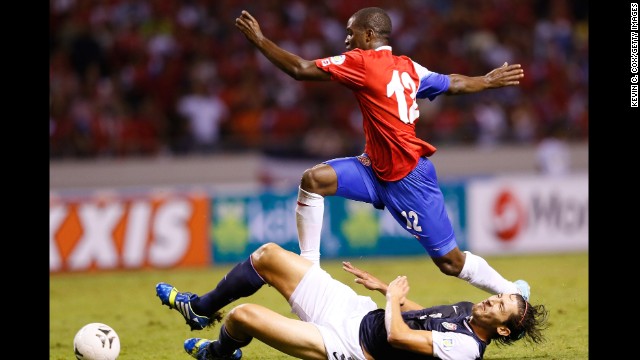 Joel Campbell (Costa Rica): Keep an eye on the 21-year-old. Costa Rica's opponents certainly will. Signed by Arsenal at age 18, he's spent the last three years on loan to French, Spanish and Greek clubs. USA fans will also remember him for his ridiculous dive during a World Cup qualifier last year. He'll be looking to redeem himself -- and his ho-hum club form of late -- with a memorable Cup, but he'll have his work cut out.
Joel Campbell (Costa Rica): Keep an eye on the 21-year-old. Costa Rica's opponents certainly will. Signed by Arsenal at age 18, he's spent the last three years on loan to French, Spanish and Greek clubs. USA fans will also remember him for his ridiculous dive during a World Cup qualifier last year. He'll be looking to redeem himself -- and his ho-hum club form of late -- with a memorable Cup, but he'll have his work cut out.  Adam Lallana (England): For the casual fan, the 26-year-old might not be among England's big names. Three years ago, he was playing in England's third division, and he hasn't scored in five caps. But he tallied 10 goals and six assists for an overachieving Southampton squad this season. As club captain, he's also displayed the leadership to complement his strong finishing, passing and tackling.
Adam Lallana (England): For the casual fan, the 26-year-old might not be among England's big names. Three years ago, he was playing in England's third division, and he hasn't scored in five caps. But he tallied 10 goals and six assists for an overachieving Southampton squad this season. As club captain, he's also displayed the leadership to complement his strong finishing, passing and tackling. 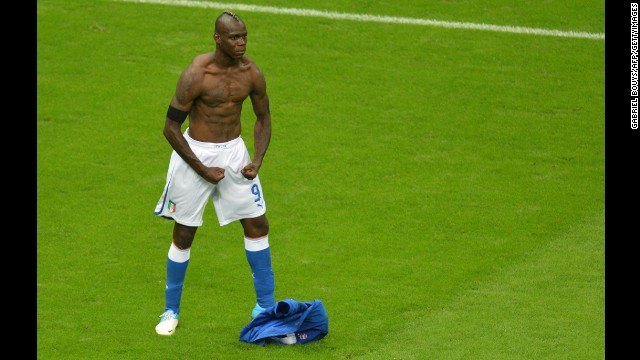 Mario Balotelli (Italy): The Azzurri is stacked with some of the world's most skilled players, including Gianluigi Buffon, Giorgio Chiellini and Andrea Pirlo, but with one off-the-wall antic Balotelli can become the story. With as many hairstyles as goal celebrations, the 23-year-old AC Milan forward loves to bring drama, but he has serious finishing skills. That will be important for an aging Italy squad known for hunkering down on defense.
Mario Balotelli (Italy): The Azzurri is stacked with some of the world's most skilled players, including Gianluigi Buffon, Giorgio Chiellini and Andrea Pirlo, but with one off-the-wall antic Balotelli can become the story. With as many hairstyles as goal celebrations, the 23-year-old AC Milan forward loves to bring drama, but he has serious finishing skills. That will be important for an aging Italy squad known for hunkering down on defense.  Xherdan Shaqiri (Switzerland): The Swiss don't have much offensive firepower (only one player has double-digit international goals), but that might change as this 22-year-old is earning comparisons to the world's top attackers. Why haven't you heard of him? Three reasons: Franck Ribery, Arjen Robben and Thomas Mueller. Some of the world's best players are attacking midfielders at Shaqiri's club, Bayern Munich. Good mentors for a budding star.
Xherdan Shaqiri (Switzerland): The Swiss don't have much offensive firepower (only one player has double-digit international goals), but that might change as this 22-year-old is earning comparisons to the world's top attackers. Why haven't you heard of him? Three reasons: Franck Ribery, Arjen Robben and Thomas Mueller. Some of the world's best players are attacking midfielders at Shaqiri's club, Bayern Munich. Good mentors for a budding star.  Christian Noboa (Ecuador): Noboa, right, plies his trade in Russia and is known for creativity, solid passing and vision. He's not a goal scorer, but Ecuador will rely on him to generate offense because, with little defense to speak of, it will need to outscore its opponents. If Antonio Valencia, Jefferson Montero and qualifying star Felipe Caicedo can get on the end of Noboa's passes, that's not at all far-fetched.
Christian Noboa (Ecuador): Noboa, right, plies his trade in Russia and is known for creativity, solid passing and vision. He's not a goal scorer, but Ecuador will rely on him to generate offense because, with little defense to speak of, it will need to outscore its opponents. If Antonio Valencia, Jefferson Montero and qualifying star Felipe Caicedo can get on the end of Noboa's passes, that's not at all far-fetched. 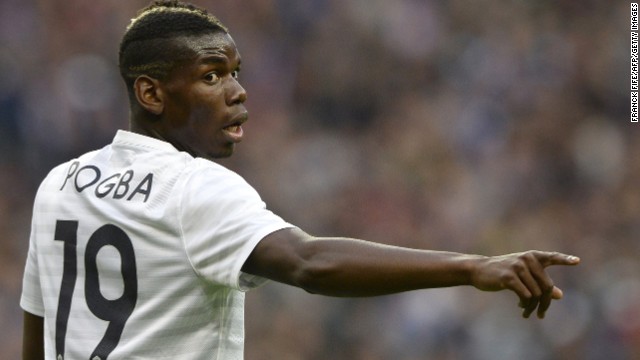 Paul Pogba (France): Les Blues want to forget a 2010 World Cup in which numerous kerfuffles between the players and manager made them a laughingstock. Pogba could be key to washing away those memories and is doubtless a future star for France. He'll feature in one of the World Cup's most talented midfields, feeding a dangerous striker corps. If you think Pogba is too young to crack the lineup, ask his teammate, onetime Juventus mainstay Claudio Marchisio, what he thinks.
Paul Pogba (France): Les Blues want to forget a 2010 World Cup in which numerous kerfuffles between the players and manager made them a laughingstock. Pogba could be key to washing away those memories and is doubtless a future star for France. He'll feature in one of the World Cup's most talented midfields, feeding a dangerous striker corps. If you think Pogba is too young to crack the lineup, ask his teammate, onetime Juventus mainstay Claudio Marchisio, what he thinks.  Jerry Bengston (Honduras): His performance for the New England Revolution has been lackluster. Just months ago, he wasn't sure he'd make the World Cup squad. He got the nod, likely because when you put him in Honduras' blue and white, he delivers a goal every other game on average. He's especially lethal with his back to goal. Honduras is outmatched on paper, so Los Catrachos will need Bengston and Carlo Costly to find the net.
Jerry Bengston (Honduras): His performance for the New England Revolution has been lackluster. Just months ago, he wasn't sure he'd make the World Cup squad. He got the nod, likely because when you put him in Honduras' blue and white, he delivers a goal every other game on average. He's especially lethal with his back to goal. Honduras is outmatched on paper, so Los Catrachos will need Bengston and Carlo Costly to find the net.  Angel Di Maria (Argentina): The perennially talented Argentines are a favorite to advance thanks to a strong defense and a set of strikers that would make any nation drool. The speed and pinpoint passing of Di Maria, left, should make the Real Madrid playmaker the star of an aging midfield. And Argentina's strike force should benefit considerably from linking up with a man who posted 87 assists (coupled with 36 goals) in the last four years for his Spanish club.
Angel Di Maria (Argentina): The perennially talented Argentines are a favorite to advance thanks to a strong defense and a set of strikers that would make any nation drool. The speed and pinpoint passing of Di Maria, left, should make the Real Madrid playmaker the star of an aging midfield. And Argentina's strike force should benefit considerably from linking up with a man who posted 87 assists (coupled with 36 goals) in the last four years for his Spanish club.  Vedad Ibisevic (Bosnia and Herzegovina): An ex-NCAA freshman of the year with Saint Louis University, Ibisevic, left, served stints in the lower leagues of France and Germany before entering the Bundesliga. Since joining Stuttgart in 2012, he's bagged 33 goals, and he has 20 goals in 51 caps for the national team. Big at 6-foot-2 and 180 pounds, defenders will surely look to keep him and fellow goalhound Edin Dzeko away from goal.
Vedad Ibisevic (Bosnia and Herzegovina): An ex-NCAA freshman of the year with Saint Louis University, Ibisevic, left, served stints in the lower leagues of France and Germany before entering the Bundesliga. Since joining Stuttgart in 2012, he's bagged 33 goals, and he has 20 goals in 51 caps for the national team. Big at 6-foot-2 and 180 pounds, defenders will surely look to keep him and fellow goalhound Edin Dzeko away from goal.  Steven Beitashour (Iran): If Iran is to make it out of the group stage for the first time -- in a likely scramble for Group E's second-place spot behind Argentina -- it will need a spirited performance from its California-born defender. A true dual threat, the Vancouver Whitecaps right back and 2012 MLS All-Star is efficient on the back line and can also streak forward. Since 2011, he has led all MLS defenders in assists.
Steven Beitashour (Iran): If Iran is to make it out of the group stage for the first time -- in a likely scramble for Group E's second-place spot behind Argentina -- it will need a spirited performance from its California-born defender. A true dual threat, the Vancouver Whitecaps right back and 2012 MLS All-Star is efficient on the back line and can also streak forward. Since 2011, he has led all MLS defenders in assists.  Ahmed Musa (Nigeria): At 21, Musa has blazing speed but a habit of flubbing goal opportunities. In 37 caps for Nigeria, he's found the net only five times. Expect the Super Eagles to counterattack, and with John Obi Mikel and Victor Moses in the midfield, you can also expect the passes to be on time. Whether Musa and fellow international underachiever Peter Odemwingie can make the most of them may dictate Nigeria's fate.
Ahmed Musa (Nigeria): At 21, Musa has blazing speed but a habit of flubbing goal opportunities. In 37 caps for Nigeria, he's found the net only five times. Expect the Super Eagles to counterattack, and with John Obi Mikel and Victor Moses in the midfield, you can also expect the passes to be on time. Whether Musa and fellow international underachiever Peter Odemwingie can make the most of them may dictate Nigeria's fate.  Miroslav Klose (Germany): With his nose for goal and a knack for nodding headers home, Klose will be on defenders' minds. His 36th birthday falling days before the Cup, the elder statesman has 14 World Cup goals, one shy of Ronaldo (no, not that Ronaldo -- Brazil's Ronaldo, the one who actually has scored proficiently in World Cups). After breaking Gerd Muller's German scoring record, Klose will look to add the World Cup scoring record to his list of accolades.
Miroslav Klose (Germany): With his nose for goal and a knack for nodding headers home, Klose will be on defenders' minds. His 36th birthday falling days before the Cup, the elder statesman has 14 World Cup goals, one shy of Ronaldo (no, not that Ronaldo -- Brazil's Ronaldo, the one who actually has scored proficiently in World Cups). After breaking Gerd Muller's German scoring record, Klose will look to add the World Cup scoring record to his list of accolades. 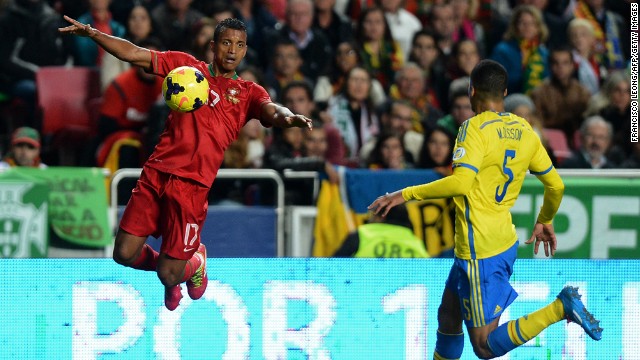 Nani (Portugal): Yeah, yeah, we were supposed to pick Cristiano Ronaldo. But with a witch doctor tampering with CR7's leg, Portugal could find itself needing some speed and creativity. Enter the Manchester United winger, whose international experience is second only to Ronaldo's. With Portugal's midfield being a relative weak spot, a lot will ride on Nani's performance. He'll need to improve on his club form of late if Portugal is to go deep.
Nani (Portugal): Yeah, yeah, we were supposed to pick Cristiano Ronaldo. But with a witch doctor tampering with CR7's leg, Portugal could find itself needing some speed and creativity. Enter the Manchester United winger, whose international experience is second only to Ronaldo's. With Portugal's midfield being a relative weak spot, a lot will ride on Nani's performance. He'll need to improve on his club form of late if Portugal is to go deep.  Mix Diskerud (USA): He says it's an honor to wear the No. 10 donned by Tab Ramos, Claudio Reyna and Landon Donovan. With the latter, Team America's top scorer, surprisingly omitted from the team, the USA will need goals. While the 23-year-old midfielder buried one in a recent Azerbaijan friendly, the burden can't fall wholly on him. Clever and quick, look for him to seek out the more goal-minded Clint Dempsey and Jozy Altidore.
Mix Diskerud (USA): He says it's an honor to wear the No. 10 donned by Tab Ramos, Claudio Reyna and Landon Donovan. With the latter, Team America's top scorer, surprisingly omitted from the team, the USA will need goals. While the 23-year-old midfielder buried one in a recent Azerbaijan friendly, the burden can't fall wholly on him. Clever and quick, look for him to seek out the more goal-minded Clint Dempsey and Jozy Altidore.  Kevin-Prince Boateng (Ghana): The Black Stars have aging stars. It's unclear if Michael Essien and Asamoah Gyan can match their past performances, so much will be expected of KPB. An astute tackler with decent speed -- and a resume that includes knocking the U.S. team out of the 2010 World Cup -- the German-born midfielder must finish and tackle well. He'll also need to be careful, because he's no stranger to bookings.
Kevin-Prince Boateng (Ghana): The Black Stars have aging stars. It's unclear if Michael Essien and Asamoah Gyan can match their past performances, so much will be expected of KPB. An astute tackler with decent speed -- and a resume that includes knocking the U.S. team out of the 2010 World Cup -- the German-born midfielder must finish and tackle well. He'll also need to be careful, because he's no stranger to bookings.  Adnan Januzaj (Belgium): The Belgians are young, and none is younger than the Manchester United wunderkind, seen at right. With one cap to his name -- and surrounded by some of soccer's top stars -- the 19-year-old might not see the field much. But consider this: In his first start for Manchester United, at 18, he scored two goals in a come-from-behind win over Sunderland. Legend has it that at age 6, he once scored 17 goals in a youth game. And if he gets playing time, he certainly won't lack confidence.
Adnan Januzaj (Belgium): The Belgians are young, and none is younger than the Manchester United wunderkind, seen at right. With one cap to his name -- and surrounded by some of soccer's top stars -- the 19-year-old might not see the field much. But consider this: In his first start for Manchester United, at 18, he scored two goals in a come-from-behind win over Sunderland. Legend has it that at age 6, he once scored 17 goals in a youth game. And if he gets playing time, he certainly won't lack confidence.  Sofiane Feghouli (Algeria): This guy's fun to watch. A midfielder for Valencia, he's arguably Algeria's most talented player despite being only 24. While he's capable of the occasional goal, defenders will be more worried about his quickness, ball control and his ability to place a pass on a teammate's foot in stride. Algeria has an inexperienced set of strikers, so they should benefit from being on the end of Feghouli's top-drawer passing.
Sofiane Feghouli (Algeria): This guy's fun to watch. A midfielder for Valencia, he's arguably Algeria's most talented player despite being only 24. While he's capable of the occasional goal, defenders will be more worried about his quickness, ball control and his ability to place a pass on a teammate's foot in stride. Algeria has an inexperienced set of strikers, so they should benefit from being on the end of Feghouli's top-drawer passing.  Ki Sung-yueng (South Korea): He's a controversial young fellow. He's snarked at fans, insulted his manager and once celebrated an Asian Cup goal with an impersonation that had some Japanese crying racism. Most recently, he put the wrong hand on his chest during the national anthem. All that aside, he's a talented central midfielder who's made more than one defender look silly since joining the English Premier League in 2012.
Ki Sung-yueng (South Korea): He's a controversial young fellow. He's snarked at fans, insulted his manager and once celebrated an Asian Cup goal with an impersonation that had some Japanese crying racism. Most recently, he put the wrong hand on his chest during the national anthem. All that aside, he's a talented central midfielder who's made more than one defender look silly since joining the English Premier League in 2012.  Maksim Kanunnikov (Russia): Boy, Fabio Capello better have this one right. The 22-year-old's first cap was last month, and his resume with three Russian clubs is mediocre. So why is he a player to watch? Because one has to wonder what Capello saw in Kanunnikov that convinced him to select him over the more talented Andrei Arshavin and Pavel Pogrebnyak. Will he break out or break down?
Maksim Kanunnikov (Russia): Boy, Fabio Capello better have this one right. The 22-year-old's first cap was last month, and his resume with three Russian clubs is mediocre. So why is he a player to watch? Because one has to wonder what Capello saw in Kanunnikov that convinced him to select him over the more talented Andrei Arshavin and Pavel Pogrebnyak. Will he break out or break down?
- There will be four World Cup games, in four locations, on Saturday
- The most highly anticipated matchup may be between England, Italy
- They'll meet in the Amazon city of Manaus; field conditions are a concern
- Greece, Uruguay, Japan, Ivory Coast, Costa Rica and Colombia will also play
(CNN) -- It's the weekend. It's the World Cup. It's Brazil.
That makes three good, maybe even great, reasons to party.
And rest assured, there will be plenty of revelry Saturday in the land of samba. There always is, on any day. But that does not mean that harsh realities won't intervene -- perhaps related to protests, stadium problems or other issues that dogged the World Cup in the weeks leading up to football's biggest tournament.
Here's a look at five things to look out for Saturday, both on and off the field.
Two European football stalwarts face off

 Goalkeeper Claudio Bravo of Chile celebrates after his team scored at the end of the match against Australia on Friday, June 13. Chile won 3-1. Today is the second day of the soccer tournament, which is being held in 12 cities across Brazil. See yesterday's best photos
Goalkeeper Claudio Bravo of Chile celebrates after his team scored at the end of the match against Australia on Friday, June 13. Chile won 3-1. Today is the second day of the soccer tournament, which is being held in 12 cities across Brazil. See yesterday's best photos  Australia midfielder Mark Milligan reacts to the score.
Australia midfielder Mark Milligan reacts to the score.  Eugenio Mena of Chile is brought down during the game.
Eugenio Mena of Chile is brought down during the game.  Chilean team fans react as they watch their team score against Australia on a giant screen showing the match at Copacabana Beach in Rio de Janeiro, Brazil.
Chilean team fans react as they watch their team score against Australia on a giant screen showing the match at Copacabana Beach in Rio de Janeiro, Brazil.  Australia midfielder Mark Milligan is pictured during the game.
Australia midfielder Mark Milligan is pictured during the game.  Chile goalkeeper Claudio Bravo saves the ball.
Chile goalkeeper Claudio Bravo saves the ball.  Jorge Valdivia of Chile lies on the field after a foul.
Jorge Valdivia of Chile lies on the field after a foul. 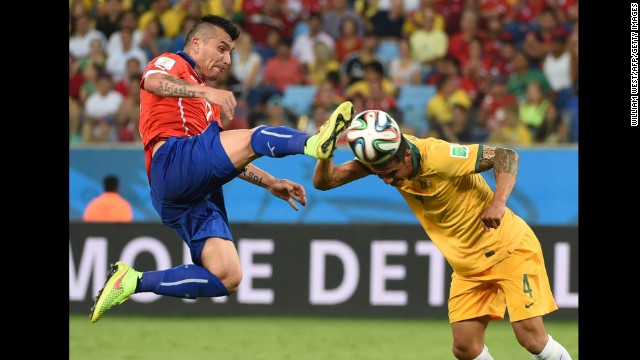 Australian forward Tim Cahill, right, and Chilean defender Gary Medel vie for the ball.
Australian forward Tim Cahill, right, and Chilean defender Gary Medel vie for the ball.  Cahill reacts during the game.
Cahill reacts during the game.  Cahill celebrates after scoring a goal and cutting Chile's lead to one during the first half. Chile had jumped out to an early 2-0 lead.
Cahill celebrates after scoring a goal and cutting Chile's lead to one during the first half. Chile had jumped out to an early 2-0 lead. 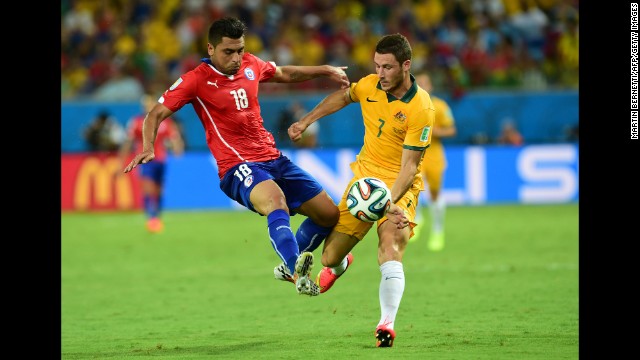 Chilean defender Gonzalo Jara, left, clashes with Australian forward Mathew Leckie.
Chilean defender Gonzalo Jara, left, clashes with Australian forward Mathew Leckie.  Jorge Valdivia celebrates after scoring a goal to give Chile a 2-0 lead. The goal came less than two minutes after Chile's first goal.
Jorge Valdivia celebrates after scoring a goal to give Chile a 2-0 lead. The goal came less than two minutes after Chile's first goal. 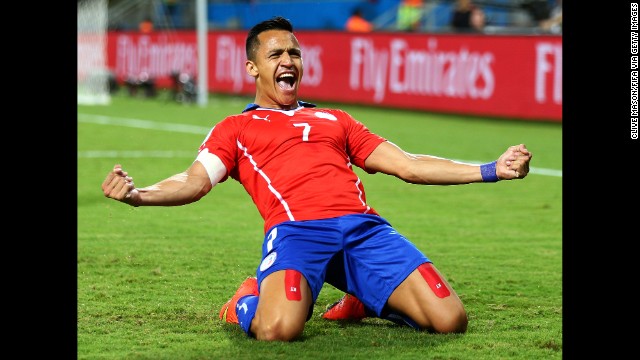 Chile's Alexis Sanchez scored the first goal in the game's 12th minute. He also assisted on Valdivia's goal.
Chile's Alexis Sanchez scored the first goal in the game's 12th minute. He also assisted on Valdivia's goal.  Australia fans cheer for their team during the game.
Australia fans cheer for their team during the game.  Chile fans hold up banners before the start of the match.
Chile fans hold up banners before the start of the match.  Dutch fans cheer in Amsterdam, Netherlands, after watching their soccer team demolish Spain 5-1.
Dutch fans cheer in Amsterdam, Netherlands, after watching their soccer team demolish Spain 5-1.  Spanish midfielder Andres Iniesta walks to the dressing room after the game against the Netherlands in Salvador, Brazil.
Spanish midfielder Andres Iniesta walks to the dressing room after the game against the Netherlands in Salvador, Brazil.  Dutch forward Arjen Robben scores the final goal in the Netherlands' victory. Robben had two goals in the match.
Dutch forward Arjen Robben scores the final goal in the Netherlands' victory. Robben had two goals in the match.  Robben gestures after scoring the final goal.
Robben gestures after scoring the final goal.  Dutch forward Robin van Persie celebrates after scoring against Spain. He also had two goals in the match.
Dutch forward Robin van Persie celebrates after scoring against Spain. He also had two goals in the match.  Stefan de Vrij, left, deflects the ball in for the Netherlands' third goal while van Persie collides with Spanish goalkeeper Iker Casillas.
Stefan de Vrij, left, deflects the ball in for the Netherlands' third goal while van Persie collides with Spanish goalkeeper Iker Casillas.  De Vrij celebrates after scoring the team's third goal.
De Vrij celebrates after scoring the team's third goal.  Robben also scored the goal that gave the Netherlands a 2-1 lead. This was a rematch of the 2010 World Cup final, which Spain won in extra time.
Robben also scored the goal that gave the Netherlands a 2-1 lead. This was a rematch of the 2010 World Cup final, which Spain won in extra time.  Van Persie scored the Netherlands' first goal on a spectacular diving header in the first half.
Van Persie scored the Netherlands' first goal on a spectacular diving header in the first half. 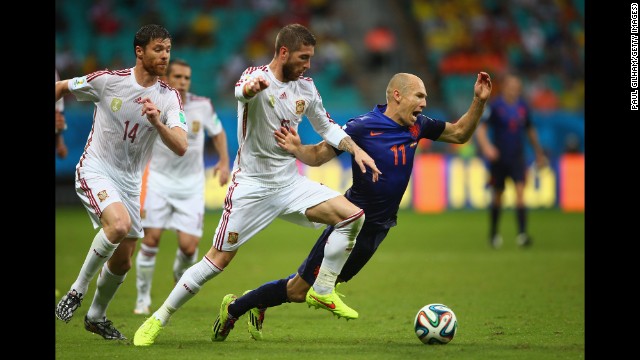 Robben is felled by Sergio Ramos of Spain.
Robben is felled by Sergio Ramos of Spain.  Spain supporters react while watching the game in Madrid.
Spain supporters react while watching the game in Madrid.  Spanish midfielder Xabi Alonso takes a fall during the first half.
Spanish midfielder Xabi Alonso takes a fall during the first half.  Alonso scores a penalty kick to give his team an early 1-0 lead in the first half.
Alonso scores a penalty kick to give his team an early 1-0 lead in the first half.  Alonso holds a teammate as Spain celebrates its first goal.
Alonso holds a teammate as Spain celebrates its first goal.  Spanish defender Gerard Pique, left, chases down Robben.
Spanish defender Gerard Pique, left, chases down Robben. 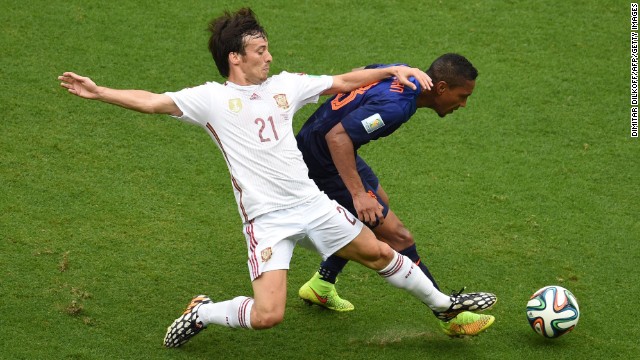 Spain's David Silva, left, vies with Dutch midfielder Jonathan de Guzman.
Spain's David Silva, left, vies with Dutch midfielder Jonathan de Guzman.  Robben heads the ball in the first half.
Robben heads the ball in the first half.  Alonso, left, falls near Dutch defender Daryl Janmaat.
Alonso, left, falls near Dutch defender Daryl Janmaat.  Pique and Robben eye a ball in the air.
Pique and Robben eye a ball in the air.  Two Spain fans kiss before the match.
Two Spain fans kiss before the match.  A Netherlands fan cheers before the match.
A Netherlands fan cheers before the match.  Oribe Peralta celebrates after scoring the only goal in Mexico's 1-0 win over Cameroon in Natal, Brazil.
Oribe Peralta celebrates after scoring the only goal in Mexico's 1-0 win over Cameroon in Natal, Brazil.  From left, Cameroon players Eric Maxim Choupo-Moting, Nicolas N'Koulou and Stephane Mbia react at the end of match.
From left, Cameroon players Eric Maxim Choupo-Moting, Nicolas N'Koulou and Stephane Mbia react at the end of match.  Peralta, third from left, celebrates his goal with teammates Miguel Layun, left, and Hector Herrera as Cameroon players look on in the second half.
Peralta, third from left, celebrates his goal with teammates Miguel Layun, left, and Hector Herrera as Cameroon players look on in the second half.  The ball sits in the back of the net after Peralta's goal.
The ball sits in the back of the net after Peralta's goal. 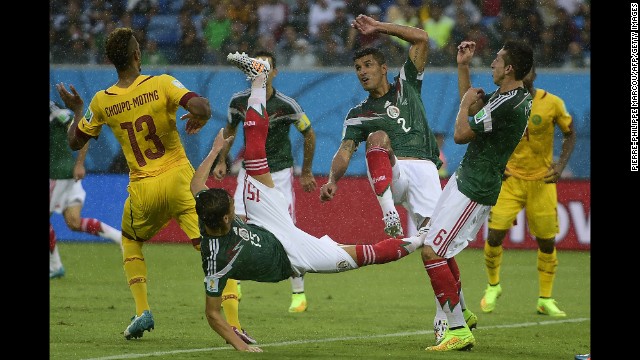 Choupo-Moting and three Mexican players compete for the ball.
Choupo-Moting and three Mexican players compete for the ball.  Alex Song of Cameroon is challenged by Mexico's Jose Juan Vazquez, left, and Herrera during the first half.
Alex Song of Cameroon is challenged by Mexico's Jose Juan Vazquez, left, and Herrera during the first half.  Mexico's Paul Aguilar jumps near Mbia.
Mexico's Paul Aguilar jumps near Mbia.  Mexican coach Miguel Herrera, center, speaks to referee Wilmar Roldan during the game. Two Mexican goals were disallowed in the first half after being called offside.
Mexican coach Miguel Herrera, center, speaks to referee Wilmar Roldan during the game. Two Mexican goals were disallowed in the first half after being called offside.  A fan holds a Brazilian flag during the match between Mexico and Cameroon.
A fan holds a Brazilian flag during the match between Mexico and Cameroon.  Song controls the ball as Mexico's Giovani dos Santos, left, challenges him.
Song controls the ball as Mexico's Giovani dos Santos, left, challenges him.  Roldan signals a call in the first half of the match.
Roldan signals a call in the first half of the match.  Dos Santos reacts after his goal was disallowed in the first half.
Dos Santos reacts after his goal was disallowed in the first half. 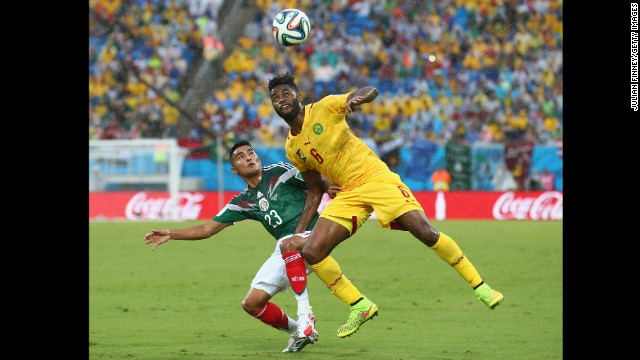 Song challenges Vazquez during the first half.
Song challenges Vazquez during the first half.  Mbia jumps for a header.
Mbia jumps for a header.  Mbia challenges Mexico midfielders Herrera, left, and Vazquez.
Mbia challenges Mexico midfielders Herrera, left, and Vazquez.  Moreno, in green, knocks the ball away from Cameroon forward Samuel Eto'o.
Moreno, in green, knocks the ball away from Cameroon forward Samuel Eto'o.  A Cameroon fan blows a horn during the match.
A Cameroon fan blows a horn during the match.  Mexico fans endure heavy rain as they wait for the start of the match.
Mexico fans endure heavy rain as they wait for the start of the match. 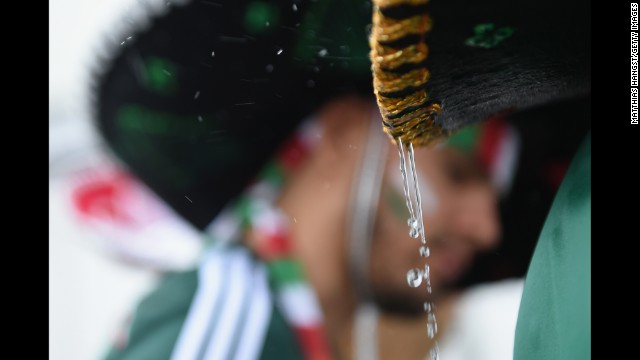 Rain drips off a Mexico fan's sombrero before the match.
Rain drips off a Mexico fan's sombrero before the match. World Cup: The best photos from June 13
World Cup: The best photos from June 13
World Cup: The best photos from June 13
World Cup: The best photos from June 13
World Cup: The best photos from June 13
World Cup: The best photos from June 13
World Cup: The best photos from June 13
World Cup: The best photos from June 13
World Cup: The best photos from June 13
World Cup: The best photos from June 13
World Cup: The best photos from June 13
World Cup: The best photos from June 13
World Cup: The best photos from June 13
World Cup: The best photos from June 13
World Cup: The best photos from June 13
World Cup: The best photos from June 13
World Cup: The best photos from June 13
World Cup: The best photos from June 13
World Cup: The best photos from June 13
World Cup: The best photos from June 13
World Cup: The best photos from June 13
World Cup: The best photos from June 13
World Cup: The best photos from June 13
World Cup: The best photos from June 13
World Cup: The best photos from June 13
World Cup: The best photos from June 13
World Cup: The best photos from June 13
World Cup: The best photos from June 13
World Cup: The best photos from June 13
World Cup: The best photos from June 13
World Cup: The best photos from June 13
World Cup: The best photos from June 13
World Cup: The best photos from June 13
World Cup: The best photos from June 13
World Cup: The best photos from June 13
World Cup: The best photos from June 13
World Cup: The best photos from June 13
World Cup: The best photos from June 13
World Cup: The best photos from June 13
World Cup: The best photos from June 13
World Cup: The best photos from June 13
World Cup: The best photos from June 13
World Cup: The best photos from June 13
World Cup: The best photos from June 13
World Cup: The best photos from June 13
World Cup: The best photos from June 13
World Cup: The best photos from June 13
World Cup: The best photos from June 13
World Cup: The best photos from June 13
World Cup: The best photos from June 13
World Cup: The best photos from June 13
World Cup: The best photos from June 13
World Cup: The best photos from June 13
World Cup: The best photos from June 13
World Cup: The best photos from June 13
 World Cup: The best photos from June 13
World Cup: The best photos from June 13  Supporting your World Cup team in style
Supporting your World Cup team in style  World Cup Sticker mania!
World Cup Sticker mania!  New challenges for World Cup sponsors
New challenges for World Cup sponsors After one game Thursday and three on Friday, Saturday will be the first day with four World Cup.
While all offer intrigue in their own way, from a sports perspective, one stands out: England and Italy.
One of them, England, claims to have invented the sport though it can only claim one World Cup title, from 1966. Italy, on the other hand, won the most recent of its four championships in 2006.
History aside, there's no clear favorite in Saturday's contest.
Italy and England are about as evenly matched as they come, heading into the tournament ninth and tenth respectively in the FIFA world rankings.
Spotlight on stadium construction
But the story for the England-Italy tilt isn't just that they're playing, but where they are playing: in Manaus.
That's probably not the first place you think of, when you think of Brazil. The capital of the Amazonas state, it is more than 1,700 miles from Rio de Janeiro.
And critics have latched on to construction of a stadium in this relatively remote locale not just for its cost, but they also question its usefulness and point out potential danger. To the latter point, a man identified as Marcleudo de Melo Ferreira fell 35 meters to his death while working to build the stadium.
Stadium construction worker dies
His was the fifth death, nationwide, involved in the construction of World Cup venues.
There are also concerns that playing games in the thick of the tropics might put players' health at risk, once the games begin.
The forecast Saturday in Manaus calls for high temperatures in high 80s. But -- even if it is in the rain forest -- there's not expected to be rain to cool things down.
Where not to find lush grass? The Amazon
Still, the game will go on Saturday at the Arena da Amazonia -- that being the official name for the Manaus stadium.
Does that mean the stadium is ready for the spotlight? Not necessarily.
The British newspaper, the Guardian, reports that power cables hang from walls in locker rooms and that workers very recently put on a final coat of asphalt.
But the main focus, and concern, is about where all the action will take place on the field.
Pictures posted online showed a spotty patchwork of grass, looking dry and bare in spots despite it being set in one of the lushest regions in the world.
Numerous reports -- and more photos -- indicate the grounds crew have been spraying the field green, to make the pitch look better.
White spray and goal-line technology
The funny thing is that having people spray the grass in the middle of a World Cup arena was supposed to be one of the biggest and best changes tied to the 2014 tournament.
Watch Saturday to see yourself: Referees now carry around a white spray they can use to mark, say, a line 10 yards from a free kick spot. It stays visible long enough to prevent players from creeping up, then vanishes soon after that.
Vanishing spray makes World Cup debut
That's not the only notable development in this year's World Cup.
Those who watched Friday's Chile-Australia contest saw the debut of a new system designed to track whether a ball crosses the goal line or not.
The system of cameras and sensors can follow the ball at a rate of up to 500 images per second and instantly alert a referee when it crosses the line.
Technology aims to get rid of 'ghost goals'
Every team has a story
Saturday's three other games, and six other teams besides England and Italy, have plenty of their own story lines as well.
For Greece, led by 34-year-old club journeyman Theofanis Gekas, it's about whether it can surge, as it did in winning the prestigious 2004 Euro tournament?
For Colombia, will goalkeeper Faryd Mondragon get on the field in his fifth World Cup to become the oldest player in tournament history? (He turns 43 later this month.)
For Japan, can it represent Asia well -- as one of the continent's most well-respected teams -- by overcoming Cote d'Ivoire, or the Ivory Coast, in a nighttime contest in Recife?
For Ivory Coast, can the 6-foot-3 Yaya Toure -- who scored 20 goals in Manchester City's championship Premier League season -- make an argument that he's one of the world's best attacking midfielders?
For Costa Rica, which cruised through qualifying -- including handing the United States its biggest drubbing -- surprise the skeptics and make its way through a packed Group D?
And can Uruguay successfully kick off its quest to go two-for-two in World Cups in Brazil, having defeated the South American superpower the last time the tourney was held here, in 1950?
Stay tuned.
No comments:
Post a Comment